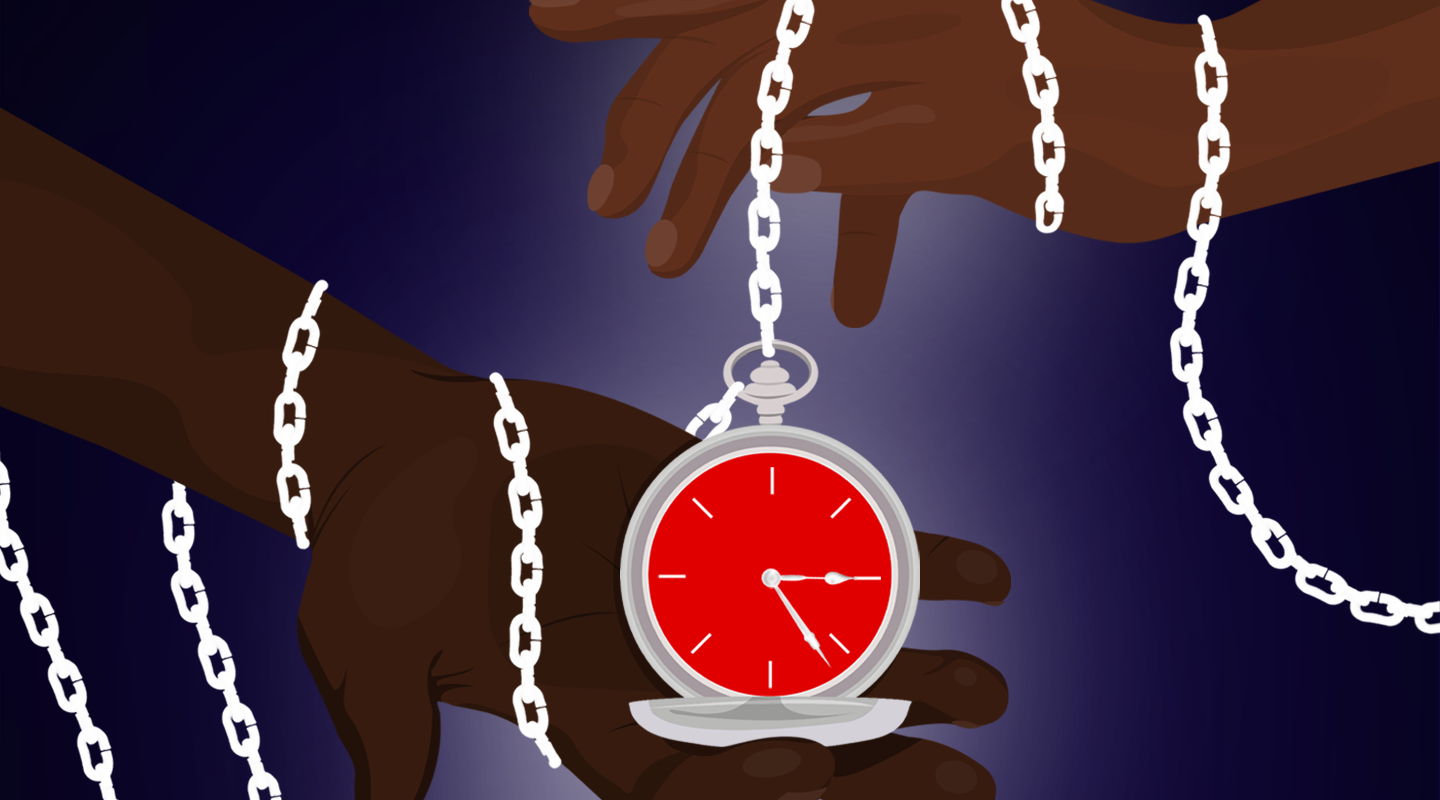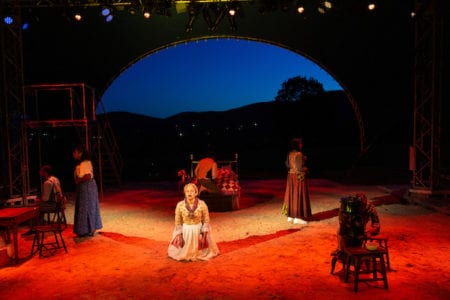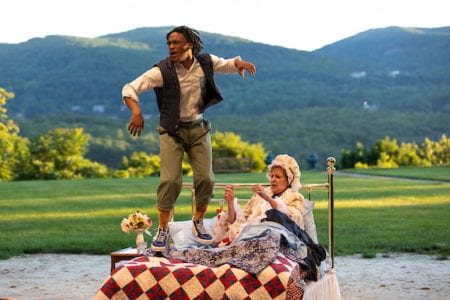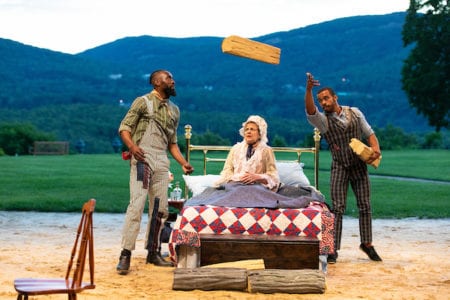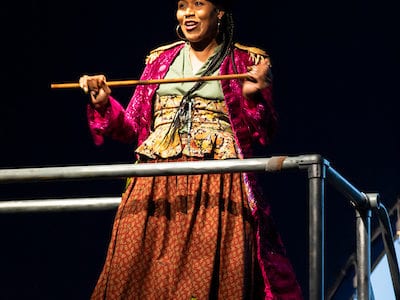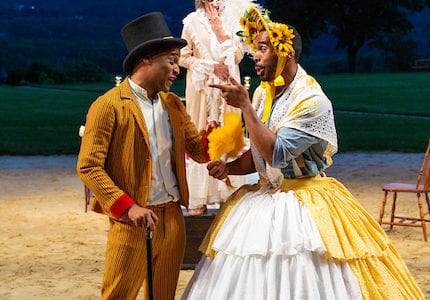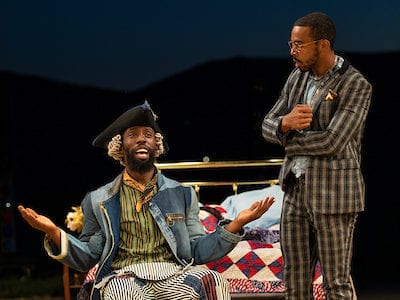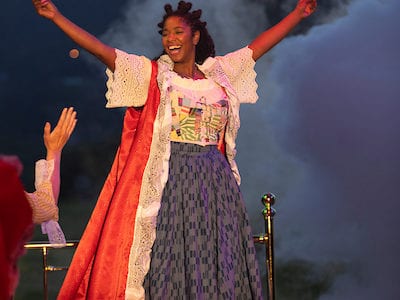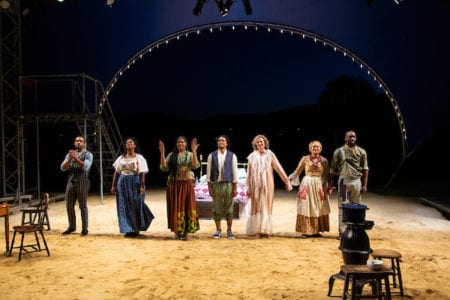Somebody’s knocking at your door. / Somebody’s knocking at your door. / Ohhhhhhh sinner…why don’t you answer.
In his will, George Washington included an order to free his enslaved people upon his wife’s death. Christmas Eve, 1800: George Washington is dead, Martha is battling a wicked fever, and those who have been held in bondage at Mount Vernon wait for the end to come, and the promised hour of liberation. As the night goes on, Martha moves through a fever dream of dizzying theatricality, exploring the hideous and enduring ramifications of America’s original sin. Taylor Reynolds directs.
THE MOST SPECTACULARLY LAMENTABLE TRIAL OF MIZ MARTHA WASHINGTON is presented by special arrangement with Dramatists Play Service, Inc., New York. Developed at the PlayPenn New Play Conference.
Not able to attend in-person?
Available now through August 15.
Buy A Ticket to Stream the Show
Cast & Creative
William Tyler Fauntleroy*
Doll Cyndii Johnson*
Sucky Boy Ralph Adriel Johnson*
Priscilla Claudia Logan*
Ann Dandridge Britney Simpson*
Davy Brandon St. Clair*
Martha Washington Nance Williamson*
Meet the Actors & Stage Management Team
By James Ijames
Director Taylor Reynolds
Costume Designer Hahnji Jang+
Dramaturg Martine Green-Rogers
Intimacy Director Teniece Divya Johnson
Lighting Designer Reza Behjat+
Properties Designer Joshua Yocom
Hair Design Nikiya Mathis
Hair Stylist & BraiderAyana Card/Kinky Rootz
Production Stage Manager Janelle Caso*
Stage Manager Roxana Khan*
Sound Designer Twi McCallum+
*Member of Actors’ Equity Association, the Union of Professional Actors and Stage Managers in the United States.
+Represented by United Scenic Artists, Local USA 829 of the IATSE.
**Member of the Stage Directors and Choreographers Society, a national theatrical labor union.
^Member of the Stage Directors and Choreographers Foundation Observership Program.
Director’s Note
What would you do to get free?
In December 1800, Martha Washington signed a deed to release the people enslaved by George Washington; they were freed on January 1st, 1801 (the enslaved people Martha inherited from her first husband’s death remained enslaved). There’s a rumor that Martha’s decision to free the enslaved was based in fear that they would kill her to gain their freedom. And it might make you ask yourself, what would you do to get free?
The Most Spectacularly Lamentable Trial of Miz Martha Washington takes us on a journey through time, space, and American history, all through the eyes of the “Mother of America”, Martha Washington. A whirlwind of fantastically terrifying and hilarious dream landscapes are concocted by a Chorus of Negro Slaves who demand Martha to grant their freedom. They laugh with her, threaten her, dance with her, and yet, she won’t budge. She doesn’t have the nearly 200 years of hindsight that we do; enslavement is just part of the natural order of things. Thinking about Martha and George enslaving people may be an unpleasant pill to swallow, yet enslavement is one of the foundational cornerstones of American history. It’s written in our historical DNA. If we have trouble digesting that, how can we begin to dismantle the beliefs and structures of our history that are still with us today?
The global racial uprisings that began in spring 2020 brought to broad light the many racial misgivings of entire industries, personal relationships, and more. Promises were made to “listen” and “do better”, books were purchased, friends added #BlackLivesMatter to their Twitter bios. And yet, much has gone unchanged. Of course, major change takes time, but some people have been waiting hundreds of years for it. And, like the Chorus of Negro Slaves, you can only wait so long for something before you consider taking it by force.
Towards the end of the play Martha says, “It was the way…we all…lived. It’s just the way it was.” I think there’s a part of us that wants to believe we would do the “right thing” in times of struggle, that we would be on the “right side” of history. Well, we’re living history right now.
I hope this production thrusts you into questioning the practices we accept because it’s just the way things are. How do we stretch our imaginations past the structures we’ve accepted as normal and reach for something that gets us all free? And what are you willing to give up to help us all get there?
Dramaturgical Notes
James Ijames
is a playwright, director and educator. If you were wondering, his last name is pronounced (“I’ms.” The J is silent).
He has appeared regionally in productions at The Arden Theatre Company, The Philadelphia Theatre Company, The Wilma Theatre, Baltimore Center Stage, Mauckingbird Theatre Company, and People’s Light and Theatre.
James’ plays have been produced by Flashpoint Theater Company, Orbiter 3, Theatre Horizon, Wilma Theatre (Philadelphia, PA), The National Black Theatre (NYC), Steppenwolf Theatre, Definition Theatre, Steppenwolf Theatre (Chicago IL) Shotgun Players (Berkeley, CA) and have received development with PlayPenn New Play Conference, The Lark, Playwright’s Horizon, Clubbed Thumb, Villanova Theater, Wilma Theater, Azuka Theatre and Victory Garden.
James is the 2011 F. Otto Haas Award for an Emerging Artist recipient, and he has two Barrymore Awards for Outstanding Supporting Actor in a Play for Superior Donuts and Angels in America and two Barrymore Awards for Outstanding Direction of a Play for The Brothers Size with Simpatico Theatre Company and Gem of the Ocean with Arden Theatre. James is a 2015 Pew Fellow for Playwriting, the 2015 winner of the Terrance McNally New Play Award for WHITE, the 2015 Kesselring Honorable Mention Prize winner for ….Miz Martha, a 2017 recipient of the Whiting Award and a 2019 Kesselring Prize for Kill Move Paradise.
James is a founding member of Orbiter 3, Philadelphia’s first playwright producing collective.
He received a B.A. in Drama from Morehouse College in Atlanta, GA and a M.F.A. in Acting from Temple University in Philadelphia, PA. James an Associate Professor of Theatre at Villanova University and resides in South Philadelphia.
Life on Washington’s Mount Vernon Estate, VA
The Mansion at George Washington’s Mount Vernon is one of the most iconic 18th-century homes in America. It is also ten times the size of the average home in colonial Virginia.
It was also home to hundreds of enslaved men, women, and children who lived here under Washington’s control.
He depended on their labor to build and maintain his household and plantation. They, in turn, found ways to survive in a world that denied their freedom.
As a young man, Washington accepted slavery, but after the Revolutionary War, he began to question it. Washington avoided the issue publicly, believing that bitter debates over slavery could tear apart the fragile nation.
He made his most public antislavery statement after his death. In his will, Washington ordered that his enslaved workers be freed at his wife’s death. Unfortunately, this applied to fewer than half of the people in bondage at Mount Vernon.
Those owned by the Custis estate were inherited by Martha Washington’s grandchildren after her death. Many Washington and Custis enslaved people had married and formed families together. For them, separation from loved ones tainted celebrations of newfound freedom.
- In 1799, Mount Vernon consisted of 8,000 acres divided into five farms, plus a gristmill and distillery. Enslaved men, women, and children lived on each farm The workers at Mansion House Farm were primarily domestic servants and craftsmen, while those on the outlying farms labored in the fields.
- Over the course of George Washington’s life, at least 577 enslaved people lived and worked at Mount Vernon. The number of enslaved people at Mount Vernon grew steadily during Washington’s residence from 1754 to 1799.
- At the time of George Washington’s death, the Mount Vernon estate’s enslaved population consisted of 317 people.
- In 1799, a team of at least ten enslaved butlers, housemaids, waiters, and cooks ensured the Washingtons and their guests’ needs were always met.
- In 1799, more than 50 enslaved men and women were trained in specific trades that kept parts of Mount Vernon’s operation self-sufficient.
- The majority of enslaved people at Mount Vernon were assigned to agricultural work on the plantation’s four outlying farms.
- The standard rations enslaved people received were cornmeal and salted fish, which they harvested themselves. In their limited personal time, enslaved people kept gardens, raised poultry, and foraged.
- The standard slave quarter on Mount Vernon’s five farms was a rough one-room log structure with a wooden chimney. On Mansion House Farm, many enslaved house servants and craftsmen lived in larger barracks-style quarters.
- At Mount Vernon, many families were separated across different farms due to their work assignments.
- Mount Vernon’s enslaved people usually had no choice but to wear clothing identifying them as enslaved. Enslaved house servants were provided more and better-quality clothing than field workers.
George Washington’s Will
In his July 1790 will, written a year after he became President of the United States in April 1789 and nine years before his death in December 1799, George Washington left directions for the emancipation, after Martha Washington’s death, of all the slaves that he owned. Of the 318 slaves at Mount Vernon in 1799, fewer than half, 123 individuals, belonged to George Washington. His will stipulated that his slaves were not to be freed until Martha’s death because of his desire to preserve the families of those who had intermarried with Martha’s dower slaves.
In accordance with state law, Washington stipulated in his will that elderly slaves or those who were too sick to work were to be supported throughout their lives by his estate. Children without parents, or those whose families were too poor or indifferent to see to their education, were to be bound out to masters and mistresses who would teach them reading, writing, and a useful trade, until they were ultimately freed at the age of 25.
In December 1800, Martha Washington signed a deed of manumission for her deceased husband’s slaves, a transaction that was entered into the records of Fairfax County, Virginia. The document was lost during the American Civil War. The slaves received their freedom on January 1, 1801, a little over a year after George’s death.
After George Washington’s death, Mount Vernon’s enslaved community was divided several times over.
Martha Washington
(June 13, 1731 – May 22, 1802) was the wife of George Washington, the first President of the United States. Although the title was not coined until after her death, Martha Washington served as the inaugural First Lady of the United States. During her lifetime, she was often referred to as “Lady Washington”.
She first married Daniel Parke Custis, with whom she had four children, and was widowed by the age of 25. Two of her children by Custis survived to young adulthood. She brought her vast wealth to her marriage to Washington, which enabled him to buy land to add to his personal estate. She also brought with her 84 dower enslaved human beings from her first husband’s estate for use during her lifetime. They and their descendants reverted to her first husband’s estate at her death and were inherited by his heirs. The Washingtons did not have children together, but they did rear her two surviving children by her first husband, including son John “Jacky” Parke Custis.
Ann Dandridge
Ann Dandridge was the daughter of Martha Washington’s father, John Dandridge, and an unknown enslaved person of mixed African and Native American descent. After John Dandridge’s death in 1756, Ann, who was a young girl at the time, went to live with George and Martha at Mount Vernon and enslaved by them.
Please Note: Guests will be required to show proof of a recent negative COVID-19 test (within 72 hours of the performance) or proof of full vaccination. HVSF Staff will accept printed and digital documentation, including the Excelsior Pass. Masks will be required for all staff and attendees. See HVSF’s detailed safety guidelines for more information.
For distancing purposes, please check a price level and our system will place you in the best available seat based on your selected price. You will not be able to select specific seats when purchasing online.
Due to the nature of our system, and the seats necessary for distancing, any attempt to edit your order once it’s been placed in your cart will result in additional tickets being added. To make changes, please delete and restart your order.
Buy Tickets
Please be sure to review your performance dates and selections before finalizing your order below. Ready to book more dates? Back to Calendar.

Tyler Fauntleroy*
William (LAMENTABLE), Ferdinand (TEMPEST)
A New York based actor, and a graduate of Virginia Commonwealth University where he earned a B.F.A. in Theatre with a concentration in performance. His most recent credits include Romeo…

Cyndii Johnson*
Doll (LAMENTABLE)
Cyndii Johnson (she/her) is an actor and writer hailing from Cleveland, Ohio. Theatre Credits Include: BLKS (Woolly Mammoth Theatre Company), How We Got On (The Cleveland Playhouse), Peter And The…
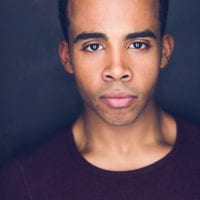
Ralph Adriel Johnson*
Sucky Boy (LAMENTABLE), Trinculo (TEMPEST)
TV/FILM: Blue Bloods (CBS), Like Father (Netflix), Madam Secretary (CBS), Friends from College (Netflix), Bull (CBS), Enough Cocaine to Time Travel (Independent Feature); REGIONAL: Shakespeare Theater Company: Demetrius in A Midsummer Night’s Dream (incl. China Performances); Trinity…

Claudia Logan*
CLAUDIA LOGAN(she/her/hers) –(MOON| On the Cusp by Beks Freeman; DR. CASEY| The Visitor by Lincoln Alpern; BIRD (Carolina Parakeet)| Welcome to the Academy by Eugenie Milroy) hails from the city…

Britney Simpson*
Ann Dandridge (LAMENTABLE), Ariel (TEMPEST)
This is Britney’s third season with HVSF. She was in the 2019 production of Into the Woods as The Baker’s Wife and in Cyrano as Roxanne. Britney first joined HVSF…

Brandon St. Clair*
Brandon St. Clair – (WOODY- Bird (Ivory Billed Woodpecker) | Welcome to the Academy by Eugenie Milroy DR. SAMUEL | Earth Cure by Serena Norr) is proud of recently becoming…

Nance Williamson*
Nance (she/her/hers) – (EARTH | On the Cusp by Beks Freeman JUDGE AUK – Bird (Great Auk) | Welcome to the Academy by Eugenie Milroy Dr. Hetta Jacobs | Earth…
Janelle Caso*
(Production Stage Manager)
HVSF: Cyrano, Into The Woods. The Public: Romeo y Julieta, Shipwreck, The Line, Coal Country, The Tempest Mobil Unit, Wild Goose Dreams, Mlima’s Tale, Under the Radar Festival, Oedipus El…
Roxana Khan*
(Production Stage Manager)
In three seasons at HVSF: Cymbeline, Much Ado About Nothing, Richard II, Taming of the Shrew, Pride and Prejudice, General From America. Off-Broadway: Greater Clements (Lincoln Center); The Dance of…
Community Conversation
Join HVSF for a virtual conversation to discuss and process the play, featuring HVSF Dramaturg Martine Kei Green-Rogers and Moraya Seeger Degeare, MA, LMFT.
- Sunday, July 11, 6pm
- Tuesday, July 20th, 6pm
- Tuesday, July 27th, 12pm
Have you seen the show? Take our quick post-show survey and register for one of our conversations.
Survery & Conversation Registration

